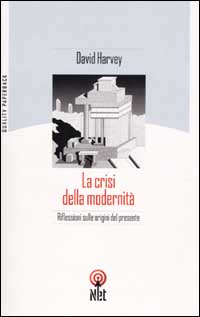| I Autori | Testi | Teorie | Costrutti Teorici | Articoli | Servizi | Associazione | Lavoro | Arte | Cerca nel sito | Iniziative | Collegamenti | Mappa |
|
||||||||||||||||||
La crisi della modernità. Riflessioni sull'orgine del presente
David HarveyThe Condition of Postmodernity. An Enquiry into the Origins of Cultural Change, Blackwell, Cambridge

pagine 462
12,80 euro
1990, ed. italiana, 1997
Il Saggiatore, Milano
"La crisi della modernità" è un'indagine che va al cuore dell'esperienza contemporanea. E' al tempo stesso una storia sociale e semantica - dall'illuminismo a oggi - del modernismo e delle sue espressioni nelle idee, nei movimenti politici e sociali, nella letteratura, nell'architettura. Al centro della riflessione di Harvey la mutata esperienza dello spazio e del tempo, la trasformazione del modello fordista in quello ad 'accumulazione flessibile', l'internazionalizzazione delle attività finanziarie e la nuova stratificazione sociale. L'effimero mostra le sue radici in questa libro che è già un classico della teoria della cultura.
Indice
Part I The passage from modernity to postmodernity in contemporary culture. This contains six chapters, including Introduction, Modernity and modernism, Postmodernism, Postmodernism in the city: architecture and urban design, Modernization, POSTmodernISM or postMODERNism?
Part II The political-economic transformation of late twentieth-century capitalism. This contains five chapters, including Introduction, Fordism, From Fordism to flexible accumulation, Theorizing the transition, Flexible accumulation--solid transformation or temporary fix?
Part III The experience of space and time. This contains seven chapters, including Introduction, Individual spaces and times in social life, Time and space as sources of social power, The time and space of the Enlightenment project, Time-space compression and the rise of modernism as a cultural force, Time-space compression and the postmodern condition, Time and space in the postmodern cinema.
Part IV The condition of postmodernity. This contains nine chapters, including Postmodernity as a historical condition, Economics with mirrors, Postmodernism as the mirror of mirrors, Fordist modernism versus flexible postmodernism, or the interpenetration of opposed tendencies in capitalism as a whole, The tranformative and speculative logic of capital, The work of art in an age of electronic reproduction and image banks, Responses to time-space compression, The crisis of historical materialism, Cracks in the mirrors, fusions at the edges.